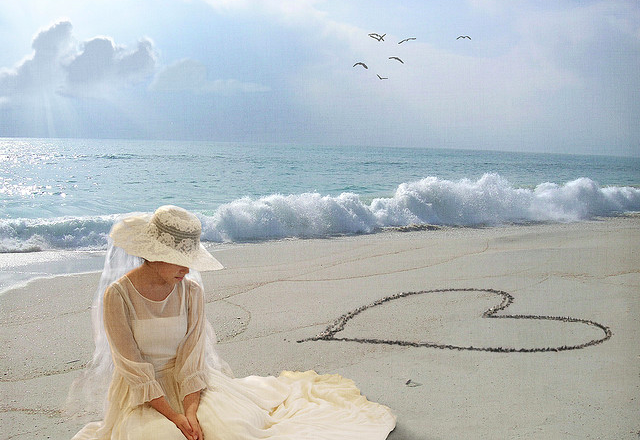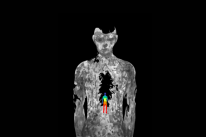
“The way you treat yourself sets the standard for others” ~Sonya Friedman
Love is a funny thing. According to modern day psychologists and cognitive neuroscientists alike, the consensus is that it is just as easy to become addicted to falling in love as it is to get hooked on street drugs. But I think maybe my favorite drug is love. I guess they’d call it my drug of choice.
The irony in that statement is beyond comprehension. Any one of us who has fallen in love, or struggled with addiction on some level, knows damn well that choice seems to have very little to do with it.
About seven months ago I came to a breaking point. I made a decision to leave my spiritual community, to seek other ways to grow and develop. I was drained from giving so much of myself, as a result of not placing healthy boundaries with others and was suffering physically, mentally, and emotionally.
I began to find it hard to breathe. I forgot what it was like to breathe deep into me.
I didn’t realize I had become obsessed with loving everyone, but never allowed myself to receive love. When you are a love junkie, you think you know how to love well. You give your love to everyone and everything but yourself.
It becomes an external solution to an internal problem. The saying goes that which we cling to, we end up losing. As a result I experienced a great deal of loss, because suffocation repels rather than invites.
Addiction comes in many forms. You can smoke pain away. Drink the sadness away. Shop, gamble, or have sex until you think you have released your pain. It always returns because it never really left in the first place.
So I tried love. It seemed like such a safe and noble way to escape the throes of my mind. And yet time after time I was left feeling empty. When you try to fill a bottomless cup from the outside, it never gets full.
It was when I stopped loving myself at the expense of loving you that I lost sight of the truth. It was all the time I spent worrying about you when I could have been working on myself. I had started my process of healing, but I got lazy along the way.
That’s the thing about addiction or escapist behavior of any form. It becomes comfortable. The slipping, sliding, and easing back into negative and unhealthy narratives. Those voices inside our heads which feed our deepest insecurities.
It can sound like this:
You aren’t good enough.
You don’t deserve someone or something like this.
You’re a bad person.
You should have done this or could have done that.
You aren’t worth the effort.
You are going crazy.
You aren’t trying hard enough.
You aren’t doing enough.
You aren’t giving enough.
Do you see a pattern here?
At the root of all junkies is the core belief that “we are not enough.”
It was easy to slip back into these thought patterns because they had been a part of my personal narrative for so long. Thinking, acting, and being healthy was very uncomfortable for someone like me. Once I allowed this negative voice to become my internal dictator, my “love junkie” was awakened.
Where I was misled was through this internal belief that things would be better if I only loved more—and this “love” was demonstrated by giving all of myself, not listening to my personal needs for space or voicing my desires, or speaking my truth in most of my closest and personal relationships, including my marriage.
I felt that if I only loved more, then maybe I would be okay. Then I would feel whole.
“Loving more,” really, was my codependency playing out, and it often took the form of:
- Not being able to say no to people’s requests, or outright demands for my time and energy.
- Feeling guilty when I asked for things or wanted to make time for myself, out of fear of being seen as “selfish.”
- Putting up with abusive behavior such as neglect, inconsideration, blaming, and shaming from friends, family, or lovers.
- Feeling that if I distanced myself from these individuals or created boundaries within my relationships, it meant that I was “abandoning” them. As an individual who has experienced childhood abandonment and neglect, this meant I would be disloyal and undeserving.
Until I was able to adopt certain practices and healthier boundaries, I could not respect myself. When I began building up that self-respect and deconstructing the self-denial I had become clouded in, I could then demonstrate authenticity in all areas of my life.
As I began to understand myself better and treat myself with compassion and kindness I began to experience self-love rather than conceptualize it mentally.
Real intimacy and connection begins internally. If we seek our happiness, acceptance, and contentment outside ourselves, we will never be satisfied. The journey starts with the first step of moving toward ourselves.
I took stock of all the energy I was expending on people around me and realized my intention to love was actually blocked by my ego’s need to seek validation. In the quiet and the stillness I closed my eyes and began on the journey to find the greatest gift of all—myself.
Today I experience self-love as a process that begins with a shift from recognizing when I am heart-centered as opposed to being centered in the mind. It is a process where one actualizes acceptance and release from the ego.
When I returned to my spiritual community, it was from a place of great humility and personal grace. I was able to see it with a new pair of glasses. I returned with nothing to prove, only a deep desire to trust in a new way of loving myself and opening up to those capable of returning that love.
Love is not an obsession. Love is not a possession or the pursuit of possessing any one person or people. True love fuels a sense of freedom and joy. It is a process of intimate liberation.
Photo by GettysGirl4260
About Robyn Phoenix
Robyn Phoenix, MSW, CHLC is a therapist by day, aspiring poet/writer, and social justice activist in her spare time. As a Certified Holistic Life Coach, she is committed to transforming herself and empowering others to let go of their “love junkie” ways and become “intimate liberators.” Stumblingsober.tumblr.com













 Though I run this site, it is not mine. It's ours. It's not about me. It's about us. Your stories and your wisdom are just as meaningful as mine.
Though I run this site, it is not mine. It's ours. It's not about me. It's about us. Your stories and your wisdom are just as meaningful as mine.
I can relate to you. I was actually doing and experiencing these things right now.
Me too!
Oh I love this article! Really its beautiful…self-help is the best help as they say.
I needed this exactly this morning. I woke up feeling dour and unhappy due to a “mistake” I felt I made last night with this new fella I’ve been seeing. The “mistake” was/is nothing more than an attempt at communication, made when I was way too sleepy to do such things, and I am afraid came across as needy. I KNOW that I am a bit of a (if not a total) “love junkie”; I fall in love at the drop of a hat and, well, love it. I was so upset last night over my admission/attempt at communication largely because I felt I was falling into old patterns again. Then, when I did as you suggested and TOOK SPACE for myself – this lovely fella and I have been hanging out an awful lot – I remembered just how insanely crucial that is.
Thanks for your reminders. I’m going to do my best to take a deep breath, remind myself that this “mistake” is nothing more than a call from my higher self that I still have some work to do, and carry on in grace, love, and confidence.
Blessings.
I am so glad you found it helpful or insightful! Thanks for sharing your comments 🙂
Very well said. I too struggle with not loving myself the way I should and in turn “love” others over my family and myself. It comes from a place of needing to be perfect and not being able to let anyone down. But in the end I usually let down those closest to me and certainly myself when I’m running into walls.
Thank you for sharing and inspiring!
Thank you so much for putting your journey into words. Like a few other readers below I’ve always loved to love someone else and have recently began learning to love myself. I have brought so many wonderful things into my life and built healthier relationships with friends and loved ones. In turn I am filled with pece and happiness every day! I know you will continue on your path sending out wonderful energy into the world!
This sounds like me and everything I am going through.
I really needed this today. I’ve been growing in my past relationship to realize that I must take care of myself and love myself to get the love I need. I ended my relationship yesterday, and I feel guilty about it in a way because I am scared that I ruined it. That the things I asked for were too much. But I know in my heart I asked for so little. And I got very little because I accepted what was given and still gave my all back. I feel so sad and confused and I hope the next time I love someone, I have learned something from all of this.
Philomele, you are not alone.
I ended a relationship several months ago because I realised that I wasn’t ever putting myself first and I only accepted things and never felt confident to say what the issue was. It was hard and I too felt guilty but at the same time an inner feeling of freedom came to me and I knew it was the right thing to do. Thanks to that experience, I have learnt so much and it feels amazing to do things for yourself. It takes time, of course, so don’t beat yourself up, just take it as it goes and see the opportunity behind it. Namaste.
Philomele- I have been through the very same situation. I have had to end it, and now after making the decision to be committed to my partner six years ago, I am learning how to get back to center (me), voice my needs from a place of love and strength and also have faith that my partner can show up for me…even when he hadn’t been able to before, and vice versa. Relationships, of any kind, take work. And sometimes they seem to bring out the things I dislike most about myself..or didn’t even know I struggled with. But as frustrating and daunting that seems- right when I give up I remember, that taking a risk brings me great joy and peace.
This piece is truly relate-able on so many levels (mentally, emotionally, spiritually, and all planes in between). I know I have compromised and sacrificed myself to various degrees all in the name of “love” and your blog so eloquently lays out how to get out of the self-destructive cycles we get into when we don’t love ourselves. Thank you for your beautiful words.
Wow beautiful thanks for such a beautiful post 🙂
Thank you for sharing!! I can totally relate to your story. I was struggling myself. Now, having reached some awareness I am at the beginning of a recovery journey. Blessings and all the best on your journey.
This is incredible. Truth written in a matter of words. To those people who have been through this similar experience, including me, understand how difficult it is to break yourself from this comfort zone that’s been created out of fear. I love this article, and it touches my heart deeply. Thank you for being so courageous to publish this, all the best in your journey. Namaste.
How would you suggest dealing with self-care – “loving myself” – feeling wrong, in the extreme? I suffer BPD (“…have no emotional skin… like 3rd degree burns…. every touch or movement is agony…” – M.Linehan, PHD) I’ve tried consistent practice, but each day is “wrong-er” than the last, and by the third or so I’m too exhausted and negative to continue, seemingly worse than when I started. (Though I have to admit the facts don’t support this – I’ve found an emotional bottom to which I quickly return, that seems to be fairly consistent for the last 3 years – much better than at any time for the last 3.5 or more decades – a fact I’ve only noticed in the last few days, and that seems to have further stabilized the mood (from exceptionally low to barely apathetic) swings – and raised the “bottom” a bit. I’ve started therapy, and have made a note to bring this up at my next visit, but am trying to be proactive and find solutions on my own.
I hesitate to say it but….. I think I may have turned some kind of corner.
And even that often feels “wrong.”
Great post. Thanks for sharing! 🙂
OMG this is so clear! I am currently trying to find a balance between myself and how I relate to relationships and your post has come to me just at the right time. I need to take care of me and take care of my relationship with myself in order to have a healthy relationship with someone else. Thank you so much for your post…
Thank you so much for this post. I too can relate fully to it, and although understand everything that is being pointed out, am finding the journey to self love a difficult one. For now, I need to hold on to the fact that I can be proud to have started the journey, and need remember to take one day at a time whilst being constantly mindful. Thank you again, and I wish everyone who is going through this a happy and peaceful journey towards self love.
Thanks for sharing. I am a year out of a relationship with a sex and love addict, its being tough at times but I am feeling better than I have done in such a long time. Your story brought home to me how far I’ve coming to terms with codependency.
Again thanks so much for sharing.
Hi
I feel for you as your case is similar to my case.I was love addicted and totally depend upon that gal and she cheated me. This post and your story remembered my days when I was in pain. I want to share the services of fivesistersranch which really help me at that time and get out of this
You all are really amazing, thank you so much for reading this article and sharing it with others!! -Tya (a.k.a Robyn Phoenix)
i really love this blog….
Beautiful!!! An inspiring post!!! 🙂 Thank you for sharing your experience and wisdom! 🙂
Confessions of a Love Junkie: Recovering from Love Addiction. just love like you want
I have spent my life growing up in an abandonment/abusive household, a child alone from 7-14 until I moved out. I spent my time after that using drugs to mask the pain until I discovered LOVE ADDICTION, 20 years and multiple relationships later I finally realize it all. I am attempting to be in a healthy, stable relationship and it is by far the hardest thing I have had to do. From overcoming stability, vulnerability, safety issues (all within myself) and trusting my mate, I find myself wanting to reject him because he doesn’t get me high. I have determined that loving ourselves is a very hard feat indeed when you give and give. But it is possible, you just have to keep moving forward.
Oh, Robyn. Like so many people, your story and your struggle is my own. You become so consumed with the media’s idea of love, your preconceived notion of love, your partner’s idea of love, that you forget the most fundamental thing–love comes from within. Because of my rough childhood abandonment problems, self love has always been my biggest and scariest challenge. I have embarked on many a relationship, hoping that if I only “loved” harder, it would be like loving smarter. Unfortunately, it wasn’t so. I am currently going through a bad breakup with someone I was dating a year (his choice not mine), and at first I felt overwhelming hopelessness and worthlessness, like I had failed at this mission I had worked so hard at. I felt that by not succeeding in this relationship, not only was I losing out on a potential “soulmate”, but I was failing at a job. I may have been right to a degree, but the test I truly failed was the one to love myself. With the support and love of a fabulous group of family and friends, I hope to start on a journey of acceptance much like yours, so that I can be happier. And hey, maybe next time the guy can see how good he has it, too!
Nice article
Thank you
Awesome article! Makes so much sense, in relation to my current journey. Thank you so much!